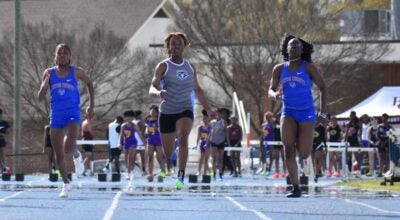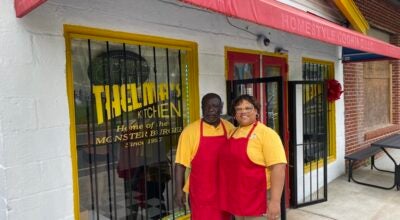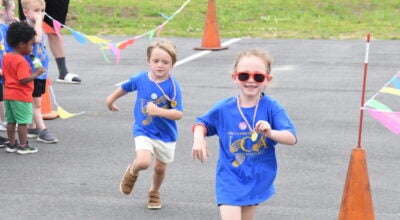Students place first in statewide FFA meats evaluation competition
Published 3:34 pm Monday, September 8, 2014
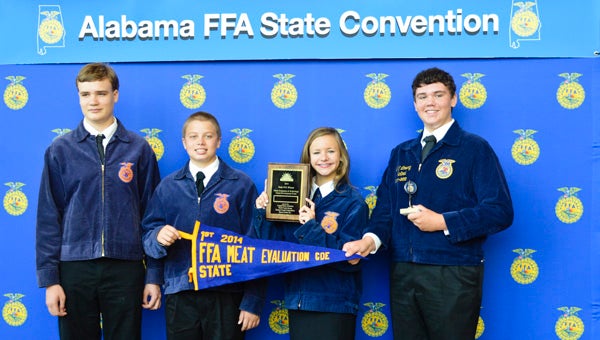
Thorsby High School’s FFA Meats Evaluation and Technology team won first place at the state competition in June. Team members are (from left) ninth graders Jerrett Posey, Cody Lucas, Aniston Bolding and Carson Littleton.
Four Thorsby High School students have become experts—and state champions—in evaluating different kinds of meat.
Ninth graders Aniston Bolding, Carson Littleton, Cody Lucas and Jerrett Posey comprise Thorsby’s first Meats Evaluation and Technology Team, which one first place at the state FFA Career Development Event for Meats Evaluation and Technology.
Thorsby’s team was one of 20 teams statewide that participated in the competition at Auburn University in June.
“They’re all real smart, so they did this and did well with it,” Thorsby FFA sponsor Brian Lucas said.
Bolding, Littleton, Lucas and Posey were eighth graders when they competed, making Thorsby’s team the youngest team at the competition.
Along with the team’s first-place award, Littleton placed first overall as an individual competitor, and Bolding placed third.
Each team had four members, and the top three team members’ scores counted toward the total team score.
Students evaluated carcasses for quality and yield grade, identified different meat cuts and placed carcasses, and identified wholesale and retail cuts.
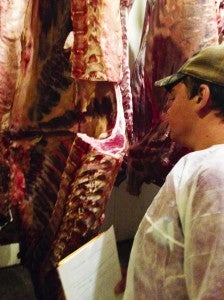
Carson Littleton examines a meat carcass during the state FFA Meats Evaluation and Technology competition in Auburn.
Students had to identify cattle, pork and lamb, Lucas said.
Quality grade is based on how much intramuscular fat a piece of meat contains.
Intramuscular fat dictates the flavor and tenderness of meat, Lucas said, so they were essentially grading the eating quality of pieces of meat.
Yield grade relates to how much edible meat will come off the animal, Lucas explained.
Yield grade is calculated with a formula that includes numbers from measuring the back fat, rib eye area, kidney-pelvic-heart fat and hot carcass weight, Lucas said.
Yield grade is based on a 1-5 scale, with 1 being the best (lean with not much fat) and 5 being the worst (not much red meat or fat).
Lucas said what the students had to do to evaluate meats at the competition was the same as what professionals do in the meat animal industry.
“At the federal level, they do not have to be quality graded, but they have to be yield graded,” Lucas said.
Students also took a written exam that covers all aspects of the meat industry, such as stores, preparation and cooking.
Littleton said he enjoyed learning how to pick out the best rib eye and learning the different cuts of meat in a hands-on way.
“I’d never seen a carcass hanging up like that before,” Littleton said. “I had a fun experience.”
Bolding said learning how to evaluate meats will help her with livestock judging because it provides an understanding of the inside of an animal and not just the outside when determining quality and yield grades of the meat.
“You get to see the before and after,” Bolding said. “The best part of it is learning the different cuts of meat even though sometimes it’s hard. You get to know where they come from.”
Cody Lucas said he also enjoyed learning about the different cuts of meat, grading carcasses and doing math to calculate yield, which he said would help him in his math classes.
Posey said he liked seeing the carcasses and determining the quality and yield grade.
Ever since they became state champions in June, the team has been preparing for the national competition to be held in late October in Kentucky.
Bolding, Littleton, Lucas and Posey practiced identifying meats and looking at carcasses at Reed’s Meat Processing in Clanton and Auburn University’s meat lab multiple times this summer.
They practice the math portion of the meats evaluation process at school.
Lucas said preparing for and competing in the competitions is invaluable for students to develop critical thinking skills, problem solving, analytical thinking skills, self-discipline and interpersonal skills working as a team.
“The things they’ve done participating in this contest will help them in whatever career path they choose,” Lucas said. “To me, self-discipline is probably one of the biggest ones. They don’t have to do this; it’s up to them.”


